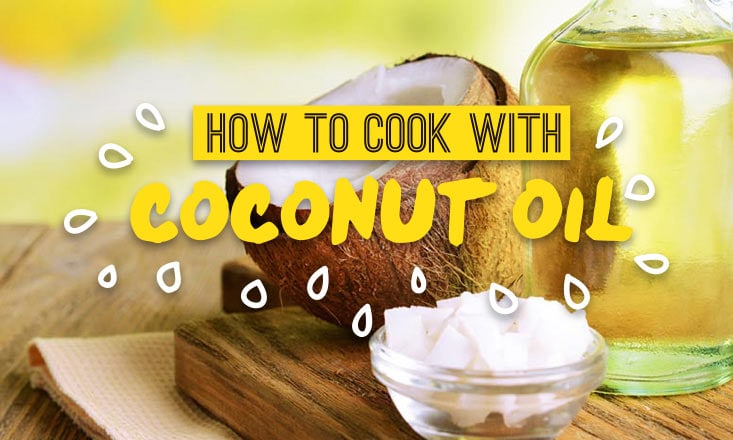Chances are you’ve read all about the magic of coconut oil by now. It has hundreds of known uses for health, beauty, and first aid, and has quickly become a staple in the homes of real foodies and DIYers.
Aside from coconut oil’s countless uses, it is first and foremost a nutritious (and delicious!) food. Some people have never cooked with coconut oil simply because they don’t know how to use it. Here are some suggestions, tips, and additional information to help you get started on cooking with coconut oil.
Suggested Uses for Coconut Oil in Food and Drinks
- Melt some coconut oil over hot cereal and top with cinnamon.
- Spread it over homemade pancakes, French toast, or waffles.
- Fry two-ingredient pancakes (1 banana + 1 egg = easiest pancakes ever!) in coconut oil.
- Lightly fry tortillas in coconut oil and cut into strips to top chicken tortilla soup.
- Add a tablespoon of coconut oil to your skillet to pan-fry chicken and/or vegetables over medium low heat.
- Add it to rice (or quinoa) instead of butter for creamy coconut rice. Top with chili powder and a pinch of sea salt.
- Substitute coconut oil for vegetable oil in desserts and baking.
- Make quick no-bake dessert bites by mixing coconut oil, honey (or other natural sweetener), cocoa powder, and your favorite nut butter.
- Add a tablespoon to fruit smoothies for a metabolism-boosting kick.
- Add a spoonful to your morning cup of hot tea or coffee.
Tips to Remember When Cooking with Coconut Oil
Coconut oil is solid at room temperature but has a low melting point. At 76° F, coconut oil becomes a liquid.
If you need liquid coconut oil for a recipe, simply stick the jar in a pot of hot water for a few minutes. Depending on where you live, your coconut oil may be completely liquid in the summer and rock solid in the winter. If you need it to solidify again, stick the jar in the fridge.
Organic virgin coconut oil is the purest of all coconut oils and is the most flavorful. Want the health benefits of coconut oil but don’t like the “coconutty” flavor? Try expeller-pressed coconut oil, which is refined for cooking at higher temperatures and doesn’t have a strong coconut taste.
For best cooking results and to receive the most nutritional benefit, avoid using coconut oil that’s been chemically processed.
The Health Benefits of Eating Coconut Oil
As more evidence comes out that vegetable and canola oils are unhealthy to cook with, more and more people are switching to coconut oil for its excellent nutritional value. The following are health benefits you can enjoy by adding coconut oil to your diet.
- Coconut oil helps people lose harmful abdominal fat without reducing calories: two studies on obese adults have shown a significant reduction in BMI and waist circumference after eating an ounce (30 mL) of the oil daily over several weeks.
- Studies show that the regular consumption of moderate amounts of coconut oil improves risk factors such as Total, LDL, and HDL cholesterol, which may reduce the risk of heart disease.
- Coconut oil is a great source of healthy fat that is beneficial for brain function.
- The fatty acids in it can kill harmful pathogens and help prevent infections.
- The medium-chain triglycerides in coconut oil can increase energy expenditure up to 5 percent and help promote weight loss as well as a healthy metabolism.
- It also helps reduce appetite, which promotes weight loss.
Added flavor, nutrition, and a kick start to good health are all just a scoop of coconut oil away. Try adding it to your diet, and see the results for yourself!
Information Source: PubMed on NCBI/Image Credit: Coconut-Merchant


